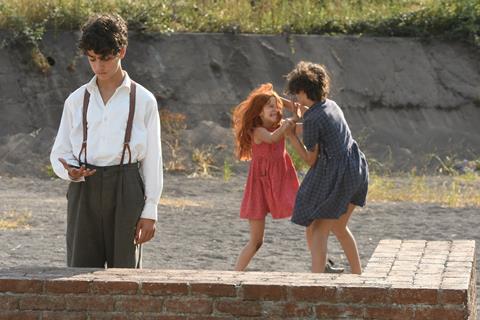A ’gently idiosyncratic memento mori’ from 90 year-old Paulo Taviani, directing alone for the first time since the death of his brother

Dir/scr: Paolo Taviani. Italy. 2021. 90 mins.
The history of the Taviani brothers is inextricable from that of modern Italian cinema, as they began their writing and directing career way back in 1954, long before films such as Allonsanfán and Padre Padrone made the duo’s international reputation. Vittorio Taviani died in 2018, but four years on – and five after their final collaboration Rainbow: A Private Affair - the 90 year-old Paolo directs alone in a plaintive yet playful film dedicated to his late brother. Leonora Addio marks something of a return to the past, inspired as it is by the life and writing of the great Sicilian author Luigi Pirandello, adapted by the brothers in their 1984 film Kaos. A poetic musing on life, history, fate and death – above all, death – this film feels very much as if it might be intended as a farewell note. Yet it shows so much invention that you hope it might spark a solo renewal, however brief, for this veteran maestro.
This film feels very much as if it might be intended as a farewell note.
Leonora Addio is inescapably the work of a man looking back at a long life, and a nation’s tormented recent history, and wondering what it all means. Elegantly and economically mixing styles, Taviani creates a formally loose patchwork that takes in fictional sequences in black and white and colour, along with archive material, both documentary and culled from Italian film history - including clips sourced from Rossellini’s Paisà, films by Antonioni, Zurlini and Lattuada, and Kaos itself.
The film begins with newsreel of Pirandello receiving the Nobel Prize for literature in 1934, a triumph he responded to with the words: “I never felt so lonely and so sad.” A passage shows a room – a stripped-back set oddly echoing the finale of 2001 - in which a dying man is visited by his children, who move from childhood to old age before his eyes. Pirandello himself died in 1936, and the film then follows the fate of his remains: Mussolini’s administration plans a Fascist funeral, while the writer insisted on being taken back to his native Sicily. In the event, his ashes stayed in Rome for 10 years – which is when we meet an unnamed delegate (Fabrizio Ferracane) from the writer’s native town of Agrigento, tasked with taking his ashes back in a Grecian urn.
A melancholically comic passage sees the official forced to leave a scheduled US Army plane back home, because other passengers refuse to travel with a dead man, even in powdered form. Instead, he takes a train all the way south, his passage in a cramped carriage affording us a beautiful chiaroscuro interlude, as other passengers play cards, bop to a piano boogie or quietly make love – one woman swooning to the solo soprano voice of a rapturous passage from Nicola Piovani’s gentle, characteristically melodic score.
Once the ashes find their eventual home – partly in a magnificent Sicilian landscape, partly in the Mediterranean skies – the film skips into another mode entirely, with a dramatization of ‘The Nail’, a story that Pirandello wrote shortly before his death which was nspired by a newspaper article. The episode concerns a murder committed in New York by a teenage immigrant named Bastianeddu (Matteo Pittiruti), and while the story is rich in symbolism - not least Christian, as the title suggests – it is inconclusive, its meaning entirely left to the viewer’s interpretation, as one suspects was Pirandello’s design. That seems to be Taviani’s design too, as the film abruptly ends with a round of applause that reminds us of the whole venture’s theatrical nature - in a way that you might either curse as frustrating, or applaud.
Leonora Addio is not a major Taviani film in the way that the works of their 70s-80s heyday inarguably were – but it’s a significant entry into the pantheon of philosophical late-period auteur statements, as offered by the likes of Bergman, Kurosawa, Varda, Oliveira et al. The formal play, inventiveness and wry humour – as represented by Claudio Bigagli’s turn as a Sicilian bishop - more than offset what might otherwise border on stately solemnity. Piovani, no stranger to the temptation of lushness, offers a restrained, elegantly moving score, while DoPs Paolo Carnera and Simone Zampagni work beautifully with both the colour of the final episode and the black and white of the preceding section, rich in subtle tones of grey, with occasional transitions into colour beautifully integrated – especially the last, which recalls a famously gasp-inducing moment in Kaos.
For the record, there is no Leonora in Leonora Addio, named after a Pirandello story that quotes a line of Verdi’s Il Trovatore. The relevant scene disappeared after an early draft of the script, but Taviani thought the title was too good to waste – which gives a taste of the impish spirit, and grace, underlying this gently idiosyncratic memento mori.
Production companies: Stemal Entertainment
International sales: Fandango Sales
Production design: Emita Frigato
Cinematography: Paolo Carnera, Simone Zampagni
Editing: Roberto Perpignani
Music: Nicola Piovani
Main cast: Fabrizio Ferracane, Matteo Pittiruti, Dania Marino, Dora Becker, Claudio Bigagli






![The Brightest SunScreen[Courtesy HKIFF]](https://d1nslcd7m2225b.cloudfront.net/Pictures/274x183/3/5/0/1448350_thebrightestsunscreencourtesyhkiff_312678.jpg)















![The Brightest SunScreen[Courtesy HKIFF]](https://d1nslcd7m2225b.cloudfront.net/Pictures/100x67/3/5/0/1448350_thebrightestsunscreencourtesyhkiff_312678.jpg)

